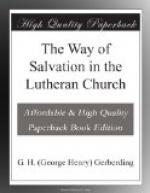In the Sunday-school the teachers are often careless and trifling. They do not live close to Christ themselves, and how can they lead their pupils nearer to Him? They scarcely pray for themselves, much less for their pupils, and how can they instil into them a spirit of prayer?
Many pastors, also, are not as earnest and consecrated as they should be. They are not burning with a desire for souls. They go through their ministerial duties in a formal, lifeless manner, and their labors are barren of results. These things should not be so, but unfortunately they are. As a result, children grow up ignorant of their covenant with God, or soon lapse therefrom, and are in an unconverted state. The communicants of the church lose their first love, and become lukewarm. An awakening is needed.
If then we admit that, owing to man’s imperfections and faults, times of refreshing are needed, why not have them after the manner of those around us? Why not adopt the modern system, have union meetings, evangelists, high-pressure methods, excitements, the anxious bench, and all the modern machinery for getting up revivals?
We will briefly state our objections to this system.
First. We object to the modern revival system, because it rests on an entire misconception of the coming and work of the Holy Spirit. The idea seems to be that the Holy Spirit is not effectively present in the regular and ordinary services of the sanctuary; that He came to the Church as a transient guest on the day of Pentecost, then departed again, and returned when there was another season of special interest. That He then left again, and ever since has come and worked with power during every revival, and then departed to be absent until the next.
Now we claim that this is directly contrary to the teaching of the Divine Word.
When Jesus was about to leave His disciples they were filled with deep sorrow. He gathered them around Him, in that upper chamber at Jerusalem, and comforted them in those tender, loving words, recorded in the fourteenth, fifteenth and sixteenth chapters of John. In these chapters He promises and speaks much of a Comforter, whom He would send. The whole discourse goes to show that this Comforter was intended to be substituted for the visible presence of Himself. His own visible presence was to be withdrawn. The Comforter was to be sent to take His place, and thus, in a manner, make good the loss. Jesus had been their comforter and their joy. They would no longer have Him visibly among them, to walk with Him, to talk with Him, to hear the life-giving words that fell from His lips. The announcement made them feel as if they were to be left “comfortless” and forsaken. But he says, John xiv. 16: “I will pray the Father, and He will give you another Comforter, that He may abide with you forever, even the Spirit of truth;” verse 18, “I will not leave you comfortless:”




